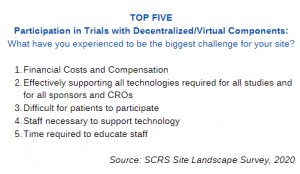The clinical research industry has seen a steady rise in study decentralization and incorporation of technology. In 2020, this trend was expedited out of necessity due to COVID-19. Although some trials came to a halt; many were able to continue in a decentralized or even fully remote environment. This response proved successful as a result of timely collaboration between Sponsors, CROs, solution providers and research sites. This ensured that trials could stay on track with tactics such as virtual visits, remote data capture and reimbursements, transportation of medical personnel and equipment, medication directly to participant homes and more.
While technology has certainly had a positive impact on clinical research, especially over the past year and a half, sites have felt the burden of an accelerated and decentralized trial landscape. While this burden was felt administratively, it was also felt financially, leading sites that may have already been in a financially precarious position to face additional expenses.
COVID-19 Places Financial Burdens on Clinical Research Sites
In the 2020 SCRS Site Landscape Survey, more than 50% of sites said that they had less than three months of operating capital, and a majority also said that they lost funds throughout the year. While this is partially due to the stoppage of studies amid the pandemic, it was also caused, in part, due to the new types of technology needed to keep existing studies afloat. While needed in the immediacy of the moment last year, the burden to select and invest in such technology should not be left to financially struggling sites, especially post-COVID.
Virtual and Hybrid Trials: Sites perceive financial risk
The SCRS surveyed sites regarding participation in both fully virtual studies, and studies with virtual components.
When asked, only 12% of sites reported being asked to conduct a 100% virtual or decentralized trial, proving that virtual studies were still not widespread. Further, of the 12% who had been asked, 58% did not participate. The reason was not due to comfortability with the trial format, rather, the cited reason was “low budget.” It is clear that sites are concerned about investing in additional technology and exploring new and innovative trial methods because of the impact on their finances.
If you are thinking that this is just a financial struggle for fully decentralized or virtual trials, think again. For sites that have participated in trials with “decentralized or virtual components,” financial costs and compensation were cited as the top challenge for their organizations.
While these technologies have clearly gained much media attention, the downstream impact on sites must be considered. Ensuring that sites are compensated for their use of the technology as well as trained on the platforms that will be used can be keys to success as the industry continues to pivot to digitized methods of patient engagement.

Sponsors and CROs Are Investing In The Future
In the new 2021 Hot Topics in Clinical Trials survey, Greenphire asked global sponsors and CROs about their views on a wide range of topics, including decentralized trials. At the time of publishing this blog, 75% of respondents indicated that they are actively investing in decentralized trial technology. When asked if they thought if decentralized trial tech is a COVID era fad, 92% of respondents disagreed.
It is clear, decentralized technology is not going away.
All of us here at Greenphire agree. While hybrid trial technology can improve the patient experience, it cannot be done at the financial expense of clinical research sites.
Just five years ago, sites were being paid on a quarterly basis. Today, the schedule has shifted towards monthly, but increasingly, Greenphire is witnessing sponsors leveraging our eClinicalGPS investigator grant payment solution to pay sites even as frequently as weekly. One such site said that “the short time between finished visit and payment of the visit is the top benefit of using the platform.” Another site said that “the ability to find the submitting, received and pending payments is instrumental to my position.”
Supporting Sites, No Matter What Method Studies Are Delivered
Technology will remain a crucial element of the clinical trial ecosystem. Lessons learned from 2020 proved that hybrid trial solutions can bring improved access and an improved experience for patients, but studies of the future are ramping up so added convenience does not come at the financial expense of research sites.


